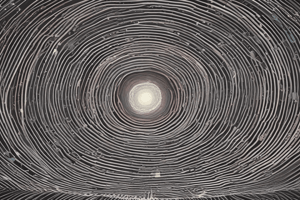Podcast
Questions and Answers
What is a magnet?
What is a magnet?
A magnet is a material that produces a magnetic field.
Which of these elements are magnetic? (Select all that apply)
Which of these elements are magnetic? (Select all that apply)
- Cobalt (Co) (correct)
- Copper (Cu)
- Nickel (Ni) (correct)
- Iron (Fe) (correct)
What is magnetism commonly attributed to?
What is magnetism commonly attributed to?
Ferromagnetism and electromagnetism.
What happens to magnetic domains after magnetization?
What happens to magnetic domains after magnetization?
What is the effect of like poles of magnets?
What is the effect of like poles of magnets?
What was Hans Christian Oersted's discovery about electric current?
What was Hans Christian Oersted's discovery about electric current?
What phenomenon is electromagnetic induction?
What phenomenon is electromagnetic induction?
What is magnetic induction?
What is magnetic induction?
In which case is an electric field present?
In which case is an electric field present?
Which case can produce a magnetic field?
Which case can produce a magnetic field?
Which device can be used to determine the polarity of an unmarked magnet?
Which device can be used to determine the polarity of an unmarked magnet?
How would you describe the magnetic field around a straight current-carrying wire?
How would you describe the magnetic field around a straight current-carrying wire?
Flashcards
Magnet definition
Magnet definition
A material that produces a magnetic field.
Magnetic element
Magnetic element
Cobalt (Co).
Magnetism causes
Magnetism causes
Ferromagnetism and electromagnetism.
Magnetized domains
Magnetized domains
Signup and view all the flashcards
Like poles effect
Like poles effect
Signup and view all the flashcards
Oersted's discovery
Oersted's discovery
Signup and view all the flashcards
Electromagnetic Induction
Electromagnetic Induction
Signup and view all the flashcards
Magnetic Induction
Magnetic Induction
Signup and view all the flashcards
Electric field presence
Electric field presence
Signup and view all the flashcards
Magnetic field producer
Magnetic field producer
Signup and view all the flashcards
Magnet polarity.
Magnet polarity.
Signup and view all the flashcards
Current-carrying wire field
Current-carrying wire field
Signup and view all the flashcards
Study Notes
Magnetism
- Magnetism is attributed to ferromagnetism and electromagnetism.
- Every atom has a magnetic field due to electron spins and domains.
- Unmagnetized materials have magnetic domains in random directions.
- When a material is magnetized, the magnetic domains align in the same direction.
- Magnets have two poles: north and south.
- Attraction: North-South, South-North
- Repulsion: North-North, South-South
- If an object attracts to a magnet, it contains ferromagnetic material.
- If an object can attract and repel a magnet, it is a permanent magnet, or is a temporarily magnetized ferromagnetic material.
Magnetic Effect of a Current
- In 1819, Hans Christian Oersted discovered that a compass needle deflected when a current was switched on.
- This discovery led to research on electromagnetism.
- Michael Faraday conducted the induction ring experiment, proving that current can be produced by changing magnetic fields.
- Electromagnetic induction is the phenomenon of inducing voltage in a conductor by changing the magnetic field near the conductor.
Electromagnetism
- Changing magnetic fields induce voltage in a closed loop.
Magnetic Induction
- Magnetic induction is the process of magnetizing a ferromagnetic substance by placing it near a magnet.
- This process causes the magnetic domains in the substance to align with the magnet's field.
Test I
- The process of magnetic induction causes a screw to behave like a magnet when it is placed close to a magnet.
Test II
- Electric fields are present around charges in motion, such as a spark jumping between two rods.
- Magnetic fields are produced by moving charges, such as a welder's arc flash.
- An improvised compass can determine the polarity of an unmarked magnet.
- The magnetic field around a straight current-carrying wire is strongest near the wire and consists of circular lines around the wire.
Studying That Suits You
Use AI to generate personalized quizzes and flashcards to suit your learning preferences.




